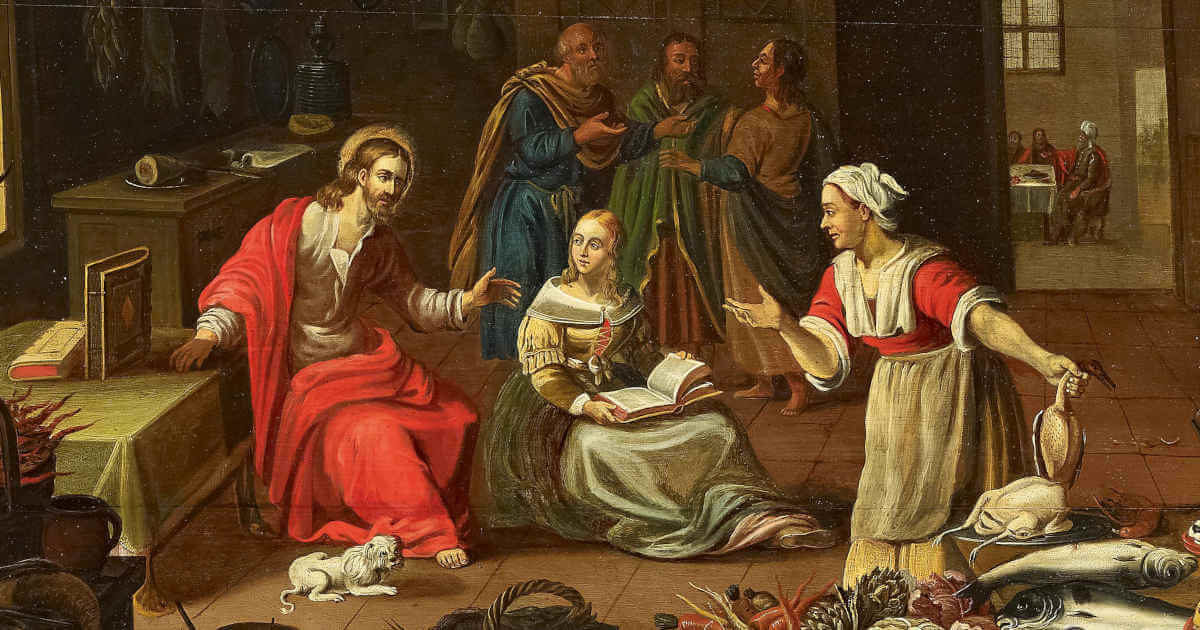
One for the busy Marthas out there! Fr Bob Eccles invites us to rethink Martha and Mary.
Here is a passage that is read, at least since the day of St Augustine of Hippo, as a straight contrast or maybe contest between an activist and a contemplative, Martha distracted by her too many courses, Mary who has chosen the best dish that is not to be taken from her as she feasts on the Lord’s teaching and devours his every word. It’s Mary who has the right idea, poor Martha who is something of an also-ran, all hot and sweaty from the kitchen fire as she is!
Meister Eckhart, the 14th century mystic and preacher, on the other hand, will have none of this way of reading the story. In a sermon he talks up Martha and takes her side in this dispute. The head of this household is that mature sensible woman with a grasp of her responsibilities, making the party go. Not crossly but gently and humorously, loving her younger sister as she does, she wants her to stir herself now, get up and find the plates and lay the table. It isn’t good for her to indulge herself mooning over Jesus, haven’t we all had a chance to listen to him already? Time to get her act together. She’s sat still quite long enough!
Now naturally Meister Eckhart like all other medieval people understood Mary of Bethany to be the same person as the converted sinner we know as Mary Magdalen, whose fuller life really began only when her Saviour was risen. Waiting in sorrow at the empty tomb she was to be rewarded with an encounter with the risen Lord, know a moment of adoration – contemplation indeed! – and was sent scurrying off to tell the men. Later on, according to legend, Mary joined some of those men to take the gospel to the south of France, and shared their adventures. Meister Eckhart informs us that she did their laundry (I knew you wouldn’t all like him!) So you see Mary’s dish was better, and not just because she relished it there and then at the feet of Jesus, but because listening to divine truth was the necessary nourishment for someone cut out for spreading the news of Christ crucified and risen – Mary truly the “apostle to the apostles” as the Church has always known her.
Eckahrt refuses to set action and contemplation in opposition. The Dominican way is that of the contemplative apostle, Eckhart’s Dominican brothers all agree: “first the bow is bent in study, then the arrow is released in preaching; see in contemplation the needs of your neighbour, think how you would like others to treat you and get ready to do the same” (an early brother, Hugh of St Cher). The art of contemplation is activity in stillness, not leaving your intellect at the door or emptying your head to repeat a mantra. We are contemplatives when we go for the best dish and devour ideas. It isn’t cool to be stupid, who else did we hear say that? Mary’s is the bright intellect fascinated by the living gospel, the word made flesh who takes his rest in that house. But the Meister believes Martha has stolen a march on Mary, for her own feeding on the divine word has already helped her to get on, her busy-ness is that of the missionary disciple. It is more perfect to stir the soup without losing the spirit of contemplation. Perhaps to stand at the stove with your wooden spoon in one hand, your volume of Dante in the other. Those who remember brother Kenelm like that in our kitchen won’t need to ask whether that particularly scholarly cook chose the path of contemplation or the path of service as the way to things divine!
But is there in our own lives a silent conflict between Martha and Mary? Is the one still trying to make the other see reason? What on earth makes us need to overwork so much! Our lives are a rush, our homes are hives of activity, and we are short on silence and recollection even at Mass (will the voices in church never slow down or pause for breath?) Whenever we fall into the trap of dividing the thinkers from the doers in our own circle, we forget that both sisters share just one vocation, to be both the disciple and the missionary: to contemplate Christ in his mysteries, and to sow the seeds of contemplation in the heart of whoever will listen.
